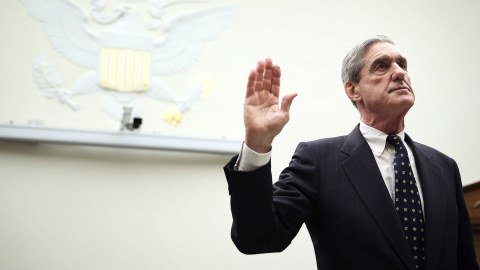Here’s how Mueller could file criminal charges against President Trump

President Donald Trump has effectively become an ‘unindicted co-conspirator’ in federal crimes after his former attorney, Michael Cohen, pleaded guilty to felony charges on Tuesday.
Now, the development is raising questions about the possibility of indicting a sitting U.S. president, and the existing mechanisms the government has in place to handle such a black swan event.
So, if Trump were to be indicted, how would it happen?
Under current regulations, the Justice Department investigates allegations of presidential misconduct through a special counsel—in this case, former FBI Director Robert Mueller.
This special counsel has an extraordinary amount of day-to-day independence to carry out investigations, but remains ultimately accountable to the leadership of the Justice Department, which is headed by the attorney general.
In theory, a president cannot directly fire a special counsel; only the attorney general can do that, and only for “good cause.” It’s complicated, however, because the president does have the power to fire an attorney general, and therefore could keep firing attorneys general until one agrees to fire the special counsel, which is essentially what former President Richard Nixon did in the Saturday Night Massacre amid the Watergate scandal.
A special counsel faces another roadblock in the pursuit of criminal charges against a president: The Justice Department has long held the legal view that a sitting U.S. president is immune from routine criminal prosecution, which “would unconstitutionally undermine the capacity of the executive branch to perform its constitutionally assigned functions.”
However, there does exist a special mechanism in the law that allows for criminal charges to be brought against a sitting U.S. president.
“In the special counsel regulations, we anticipated for the possibility that something unusual might happen, and there’s a mechanism for Mr. Mueller to go and seek the indictment,” Neal Katyal, a lawyer who drafted the special counsel regulations that govern Mueller’s investigation, told The Daily podcast.
Should Mueller decide to pursue criminal charges against the president, he would first have to obtain permission from the acting attorney general, Deputy Attorney General Rod Rosenstein.
“If Rod says yes, the criminal process will unfold against the president,” Katyal said. “If Rod Rosenstein says no, that triggers a report to Congress, and it’s a mandatory report at that level. And then Rosenstein and Mueller have to explain what happened to Congress. And that then provides sunlight into the process.”
This mandatory report is designed to be a fail-safe that prevents a politically biased attorney general from thwarting a fair investigation. After all, the attorney general is appointed by the president, and it’s possible that an attorney general will adhere to party politics instead of principle.
But the mandatory report at least guarantees that Congress, media and the public are provided a description of why the Justice Department decided not to pursue criminal charges. Congress could use that knowledge to decide on impeachment motions, though the odds of an impeachment would be arguably lower in situations where Congress is controlled by the same party as the president, as is the case today.
Katyal said he and his colleagues created the fail-safe mechanism after considering the possibility of a ‘black swan’ event reminiscent of the Nixon era.
“We imagined it, but it was the nightmare scenario,” he said. “We were writing at a time in the shadow of Nixon, so we understood the possibility that you could have a president who is alleged to be deeply corrupt and deeply antithetical to the rule of law. I sure hoped that it would never be something I’d see in my lifetime and that the country wouldn’t see, but we wrote for that possibility.”





